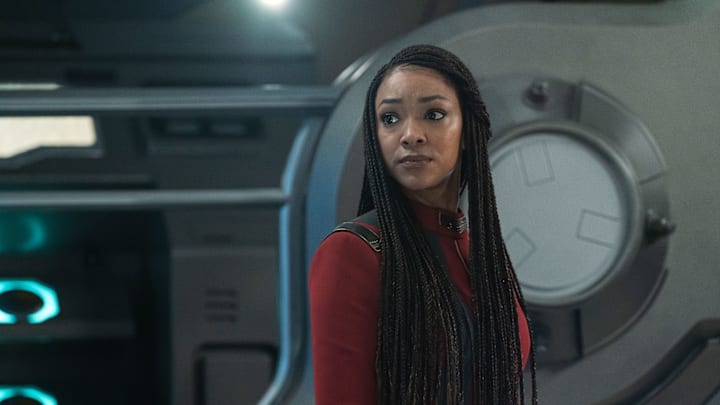Star Trek: Discovery critics have had a field day with "Labyrinths," the eighth episode of the series final season. When Captain Burnham (Sonequa Martin-Green) is trapped in a puzzle only her mind can unlock, it's an emotional moment that provides the key she needs. Burnham recognizes her fear of failure, and for that, critics are calling this episode one of Discovery's worst because emotion solved the problem not logic or tactical manuevering.
In an article for Den of Geek, writer Joe George notes that it's "weepy" moments like these that have been a mainstay of Discovery. To say that Discovery is a more emotional series would be correct; however, some of the best episodes of the olderTrek series were based on emotions and not logic, the use of technology, or an officer's superior skills.
"The City on the Edge of Forever" detailed Captain Kirk's emotional response with having to let go of the woman he loved to save the world. Star Trek: The Next Generation's "Family" allowed Captain Picard to come face to face with his time as Locutus of Borg. There was also "The Offspring," Star Trek: Deep Space Nine's "The Visitor," Star Trek: Voyager's "Tuvix," and Star Trek: Enterprise's "Terra Prime," to name a few. All of these would be considered emotional episodes, and there are plenty more where these came from. But a few episodes that focused on a emotion don't define a series.
We've had plenty of action, sci-fi, and technology in the newer Trek shows, but there are times when emotions are needed and should be utilized. While Starfleet officers receive training on how to stay in control when in difficult circumstances, most of them are not androids. So emotions are still going to come to the forefront.
Having the officers show emotions makes them more relatable, and Captain Burnham was feeling what plenty of us feel. That is another way that Star Trek connects with its fans. Let's don't move away from what makes Star Trek great, and that is the perfect blend of emotion, logic, skills, and technology. Sure one may take precedence over the others in an episode here or there, but an entire series isn't based on any one of them.
